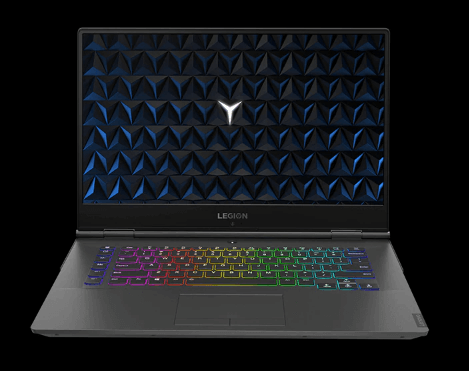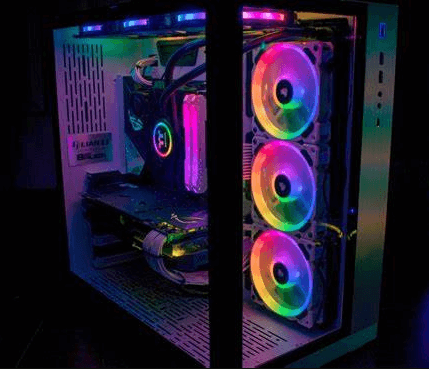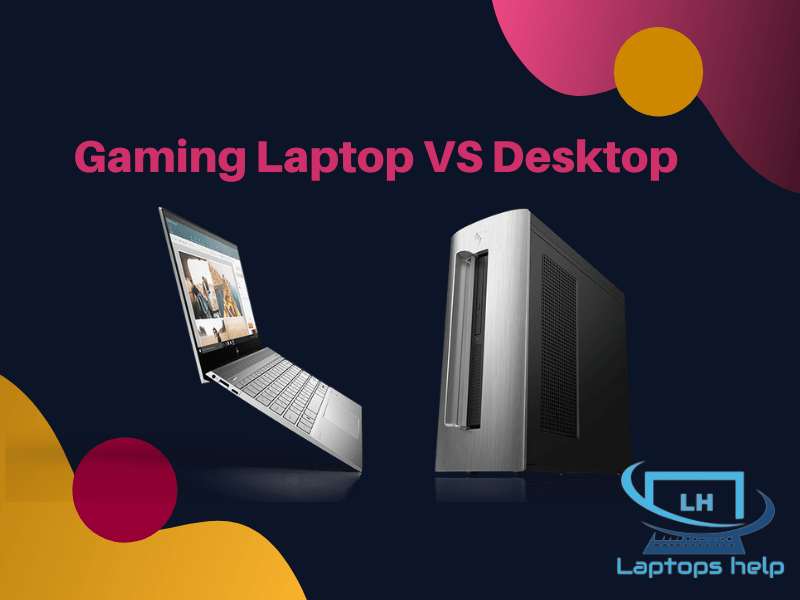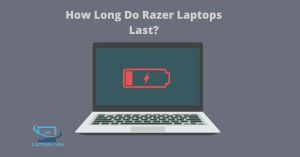The gaming experience between the two has narrowed. There are still several pros and cons between buying a new high-end gaming laptop and an equivalent high-end gaming desktop PC. The most important thing to help you choose between a laptop or desktop is to weigh the pros and cons of a gaming laptop and desktop concerning your specific needs. So let’s start it.
Advantages and disadvantages of gaming laptops over gaming desktop
Pros:
Gaming laptops are about half the size of a gaming desktop, so if you have limited space, Gaming laptops are the best option for you. It also doesn’t require much maintenance, so it might be easier if you’re not very tech-savvy.
Gaming laptops are more powerful than regular laptops. They usually come with more powerful graphics cards so that you can run games at higher resolutions and frame rates. Just because you’re on the go doesn’t mean you want to compromise on performance or features.

If you have a laptop that can handle your games but doesn’t have a good GPU, you can buy a discrete graphics card for a low price. Gaming laptops are a must for gamers.
Gaming desktops are usually cheaper than gaming laptops. In addition, gaming desktops are more powerful than similarly priced gaming laptops. The price difference between laptops and desktops is about the same.
Cons:
Gaming laptops have the disadvantage of a cooling system. Gaming laptops typically have dual-fan cooling systems that can make loud, distracting noises. If you plan to play for a long time, you might consider investing in a laptop cooler.
One way to reduce noise is to place the laptop on a bed or other surface that absorbs sound well. This prevents the sound from amplifying and protects your body from the heat generated by the device.
The graphics card is also integrated into the laptop’s motherboard, so it’s less powerful than a gaming PC. This won’t work well if you want to play on high settings. Gaming laptops also get hotter than PCs because of their small size.
Another downside is the price of desktops vs. laptops. However, laptops are more expensive than desktops. A typical gaming laptop costs $1,000-$2,000, while a regular laptop typically costs $500-$800. However, if you decide to buy a gaming PC, you can get it for less than $500.
However, Gaming laptops are the best choice if you want portability. A PC is for you if you have space constraints or prefer a desktop.
Advantages and disadvantages of gaming Desktops over Laptop
Pros:
The advantages of gaming desktops are that they are cheaper than laptops, offer better performance, and can be upgraded with new hardware. Desktops also have better cooling than laptops, which is useful for gamers who play games on the go.
Cons:
One of the main drawbacks of desktop computers is that they are not portable. It is bulky and cannot be moved easily. If you want to play on the go, a laptop is your best bet.
Gaming Laptop VS Desktop 2022
If you want to play on the go, a laptop is your best bet. Gaming laptops come with more powerful graphics cards and offer cutting-edge gaming features such as backlit keyboards and additional buttons that can be programmed for specific gaming functions.
On the other hand, gaming PCs are more versatile, cheaper, and offer more storage space. A desktop is a perfect choice if you play games but don’t have time to play on the go.

PCs are more versatile because they hold more data and are cheaper, doing everything a laptop can do. However, a gaming laptop is worth considering if you want a portable product that allows you to play on the go.
However, gaming laptops don’t offer as much storage or processing power as desktops, so there are some limitations to the types of games you can run.
Processor:
There is still a fairly large performance gap between laptop and desktop CPUs. Due to the same power and thermal limitations of notebook GPUs, mobile CPUs must also be slightly underpowered to maintain safe operating temperatures.
For example, the popular Intel CPU on many gaming laptops is the Intel Core i7 10750H with 6 cores and 12 threads, while the desktop i7 10700 is an 8 core/16 thread CPU that is 20% faster than the 10750H. This performance difference results from fewer cores and threads and 45 watts of power consumption as opposed to the 65-watt 10700 desktop CPU.
In the past, only Intel mobile versions of CPUs were available in gaming laptops. Still, advances in AMD’s ZEN2 and 3 architectures have made AMD’s mobile offerings on par with and outperform many of their competitors’ chips.
A is currently offering AMD’s Zen3 Ryzen 9 5900HX, with the Ryzen 7 5800H coming in 2022. The advantage of the new 5900HX is its 8-core/16-thread count and 4.6 GHz turbo speed, which provides better performance for high-resolution, high-settings gaming as well as multi-core workloads like video rendering.
Top-end AMD mobile CPUs and NVIDIA GPUs allow you to deliver a similar gaming experience to your desktop compared to other low-end processors.
Graphics card:
A graphics card (GPU) is one of the most important components in a game, so it is important to have the best GPU for a perfect gaming experience. There are many differences between desktop PC graphics cards and laptop GPUs.
In previous generations, laptop GPUs performed poorly compared to desktops. Then came the era of mobile desktops that offered near-desktop performance but required massive, heavy chassis due to the thermal requirements of the components.
Modern gaming laptops balance portability and power with improved cooling and component thermal efficiency.
For example, the 150+W RTX 3080 GPU is almost certainly only found on larger and heavier laptop models to avoid overheating and thermal throttling, while the 115W model seen in the MSI GE75 Raider 10Sx hits the sweet spot of the RTX. Manageable temperature and noise levels of system fans providing cooling due to 3080 level performance and low power consumption.
Similarly, AMD’s Radeon RX 6000 series mobile graphics cards bring the best AMD RDNA 2 architecture to the laptop space, delivering ultra-fast frame rate gaming experiences and advanced content creation to laptops using these cards.
The RX 6800M and RX 6700M offer the same class of NVIDIA RTX cards and trade blows, with higher VRAM for greater productivity and higher performance demands for gaming tasks.
RAM:
RAM or Memory isn’t particularly an issue on high-end laptops, but it can be a problem on low-end gaming laptops that lack the amount and speed of Memory. Laptop motherboards typically only support two SO-DIMM slots, which may limit RAM expandability if your laptop has one low RAM DIMM.
To get the amount of RAM you want on a low-end gaming laptop, you may need to buy a full two DIMM kit to replace a small number of DIMMs instead of adding a single stick to your existing one.
Accessing your laptop’s RAM and storage drives can be difficult if your laptop uses uncommon screw types such as star or hex screws for the bottom body panel. Making sure your laptop has at least 8GB is important to get the most out of your gaming system. A minimum of 16 GB is recommended to ensure the laptop performs optimally over time.
Storage:
Unlike desktop gaming PCs, one of the storage limitations of laptops is the number of drives they can support. Typically, a laptop can only support two internal drives that are only SSDs before you have to use an external drive for expansion. On the other hand, desktops may have high-capacity hard drives or more storage drives than high-speed SATA or M.2 SSDs.
As SSD capacity increases and becomes cheaper over time, storage issues are less common in laptops than ever. Most gaming laptops on the market offer enough space and speed but support NVME SSDs, which can be inadequate for large video files.
You can also install an additional SSD after removing the bottom panel of the laptop, revealing the storage and memory slots on the motherboard. The hardware in modern laptops can handle the workload, but storage can be limited.
A common solution to this complexity is to create a NAS or network-attached storage that allows users to offload files to a mass storage PC on the network. This can be complicated to set up, especially if you plan to work with your laptop in various locations and networks, but it can be most useful when properly configured.
Cooling:
The main advantage of a gaming desktop is the flexibility of the cooling solution. Gaming PCs can come in various shapes and sizes that affect the cooling of their internal components. Cases are used for gaming desktops supporting large aluminum air heatsinks or water-cooled radiators.
This much larger volume allows the desktop to support more powerful components, and if the cooling solution is large enough, it can support hardware overclocking to boost performance further.
The small form factor of gaming laptops forces cooling limitations, a major driving force behind downclocked laptop chips. The laptop gets very hot under load. There are several ways to optimize the cooling of your gaming laptop, so you can increase the number of frames per second in gaming and lower the temperature.
The form factor of a gaming PC also plays a big role in how the PC sounds when loaded. Gaming laptops generate a lot of heat in a small space and have tiny fans that have to spin at incredibly high speeds to properly cool high-end CPUs and GPUs.
The combination of small fan blades and high RPM can create high-pitched fan noise that can be particularly loud but is necessary to ensure thermal management.
Portability:
Portability is almost always the main selling point for gaming laptops. It’s the perfect choice for any student as it’s easy to carry in your backpack for your gaming laptop. There are small desktop PCs, but they don’t have the same level of portability as laptops, especially when considering peripherals and monitors.
Traveling with a high-performance PC is a luxury that only notebook gamers can experience. Laptops with high-power components are also ideal for gamers looking to attend LAN parties. The portability of gaming laptops is a major factor giving many gamers a lack of customization and slightly lower gaming performance.
It’s far more portable than any gaming desktop because the display, keyboard, and PC hardware are all in a single device. The amount of IO in gaming laptops allows people to use their laptops as desktops at home. By leveraging a large desktop monitor, external mechanical keyboard, and gaming mouse on a laptop, players can reap all the productivity benefits of using a desktop.
Customizable:
A gaming PC that you can personalize affects the aesthetics of your PC gaming setup. While laptops can only be customized through various components, gaming desktops are customizable in almost every aspect. PC cases can come in various sizes, from small form factor mini-ITX to large high-tower PCs with plenty of space for water-cooled radiators, storage, and large hard drive cages.
You can also choose the color, airflow, and whether you want transparent side panels. The case can be customized via modding to create custom-themed PCs that often look like show pieces. While laptops require absolutely no customization when it comes to motherboards, desktops can support many different motherboard types, colors, and sizes.
Manufacturers also play a big role in customization options, and many gamers prefer to match hardware from the same manufacturer to create a consistent design. Another major factor in customization is the choice of cooling. Hardcore gamers tend to enjoy the look of the RGB water-cooled roof, and some like the clean, minimalistic look of an air-cooled setup.
Denote:
The only limitation of gaming laptop displays is their size in the 13 to 17.5 inches range. Gaming desktops can support monitors or even televisions of any size or resolution. Laptops have the same quality and resolution choices as gaming desktops. Many laptop displays come with high refresh rates that are ideal for competitive first-person shooters, and these refresh rates range from 120Hz to 360Hz.
Gaming laptops and desktops have high pixel densities, providing the best image quality when viewed up close or from an angle. Most commonly, gaming laptops have a 1080P or 1440P display, so games run smoothly and retain high-quality images. Gaming desktops may be better suited to supporting 4K resolutions for gaming due to the increased performance of desktop graphics cards.
Some laptops come with 4K displays, but 4K games with the thermal limitations of laptop GPUs are not optimal or recommended.
Keyboard:
In recent years, some high-end laptop models have built-in mechanical keyboards that can last much longer than traditional membrane keyboards. Your laptop’s keyboard cannot be changed or upgraded, making it problematic as it wears out over time.
On the other hand, desktops have various keyboard options, from standard membrane keyboards to custom mechanical keyboards with RGB lighting and macro keys. Most gaming laptops have membrane keyboards, so taking good care of your keyboard is important to maximize the life of your keyboard. Many of these built-in membrane keyboards feature RGB lighting to satisfy gamers’ aesthetics and customizability.
Touchpad/Mouse:
Anyone who’s ever used a gaming laptop knows how frustrating it can be to use a touchpad. This applies to playing fast-paced shooter, click-and-drag, or strategy games. On the other hand, if you plan to use a mouse for your gaming desktop, you will also need a mouse.
Conclusion: Are Gaming Laptops Better Than Gaming PCs?
At first glance, gaming rigs may seem superior to laptops, but the performance gap has narrowed considerably as computer hardware has advanced. Unlike the desktop, the gaming experience on the laptop is slightly different.
The decision comes down to which elements of laptop and desktop you prefer. No need to think about it if portability is your priority over a gaming laptop, but if a stationary gaming system isn’t an issue, a desktop might be your best bet.
Another major factor that can influence someone’s desktop choice is customizability. If gamers love the aesthetic of a perfect gaming setup, customizing their gaming desktop to fit their room, desk, and peripherals will make their desktop laptop less simplistic and sway their minds toward it.
However, gaming laptops also have better graphics cards and are more powerful; the main thing is portability. If you travel, many gaming laptops will be your best bet.
Ultimately, there is no clear winner in the desktop-to-laptop debate, and both can easily offer enjoyable gaming experiences.
Gaming Laptop VS Desktop 2022 FAQs
Are gaming laptops better than PCs?
Modern gaming laptops can be very efficient and powerful. The desktop may still have a performance advantage regarding advanced components and thermal considerations, but the difference is far less pronounced than before.
Are gaming laptops more expensive than desktops?
Gaming laptops cost more than gaming desktops. Laptops are almost always more expensive when you see both options with similar performance. This means that with the addition of a monitor, speakers, keyboard, mouse, and headset, the price of a desktop PC can exceed that of a laptop.
Why are laptops more expensive than desktops?
The main reason laptops are more expensive than desktops is the development cost to create hardware that is compact enough and simultaneously meets expected performance levels. And the big challenge isn’t just performance.
Does a gaming laptop hotter than a desktop PC?
Whether gaming laptops run hotter or cooler than desktop gaming PCs is debatable. An important point to note is that the performance levels are different. Laptop components generate less heat due to the low power supply.
If you plan to play for hours at a time, this design issue could start to overheat your laptop. Problems can only worsen if you plug in your laptop and play together!
Is 95 too hot for the CPU?
The 95 isn’t too hot for a CPU, but if you plan to play games or run programs that require a lot of power, it’ll be more difficult to prevent your laptop from overheating.
The problem with connecting these devices and playing them simultaneously is that they use more battery life. So when this design flaw starts heating your computer, less energy is available to fix it!
Can a gaming laptop compete?
Because of their reputation, PC gamers have long avoided gaming laptops. Gaming laptops used mobile-only chips that were far less powerful than desktop-grade components before CPU and GPU power efficiency improved.
Older gaming laptops cost significantly less than gaming gear for the same gaming performance. The stigma surrounding laptops has also greatly diminished as gaming laptops have become more affordable and perform better than desktops.
While the price differential and gaming experience have narrowed, choosing a high-end gaming laptop and a desktop computer still has pros and cons. To make the perfect choice when buying a laptop or desktop, it’s important to consider your own needs and weigh the pros and cons.
Do laptops outlast desktops?
Laptops generally have a shorter lifespan than desktops. More specifically, a laptop can only last 2-3 years. Because desktops have bigger CPUs, laptops are smaller and have much less ventilation.
Should I buy a gaming laptop?
There are several important factors to remember when choosing between a gaming laptop and a desktop. Gaming laptops are smaller and more portable, while gaming desktops are larger and more customizable. Both are great options, but both have their pros and cons.
If you have a desktop, is your laptop worth it?
Not only are desktops a lot more reliable than laptops, they usually last quite a bit longer, often perform better, and are much easier to repair if something goes wrong. Desktops are also cheaper to purchase and withstand harsher usage better than laptops.
Is a desktop better than a laptop with the same specs?
There are no two ways about it. Desktops with laptop-like components run faster and more smoothly. That’s because desktops usually come with full-size parts that are more powerful than similar parts designed for laptops. This is especially noticeable in the overall speed of the processor and computer.
Are laptops slower than desktops?
Function. Computers need power for speed. Laptops naturally run slower because they are designed to save energy. Laptop hard drives are typically smaller, have less storage, and run slower than desktop devices.
What is the difference between a laptop and a desktop?
A laptop is a portable device you can connect to wherever you go. The desktop can be located at home, in the office, or designated gaming space.
Why do you need a gaming laptop?
Gaming laptops are great for gaming on the go. It offers cutting-edge gaming features such as more powerful graphics cards, backlit keyboards, and additional buttons that can be programmed for specific functions. Gaming desktops are more versatile, cheaper, and offer more storage space.




